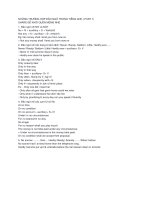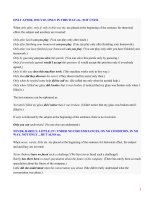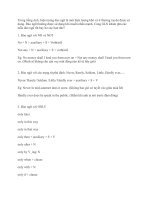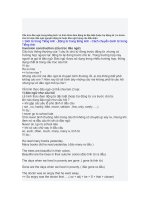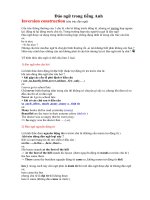Lý thuyết đảo ngữ trong tiếng anh
Bạn đang xem bản rút gọn của tài liệu. Xem và tải ngay bản đầy đủ của tài liệu tại đây (155.92 KB, 4 trang )
KHÓA HỌC LUYỆN THI ĐẠI HỌC
GRAMMAR
SỰ ĐẢO NGỮ (INVERSION)
1) Đảo ngữ với NO và NOT
No + N + auxiliary + S + Verb (inf)
Not any + N + auxiliary + S + verb (inf)
Eg: No money shall I lend you from now on = Not any money shall I lend you from now on.
(Mình sẽ không cho cậu vay một đồng nào kể từ bây giờ.)
2) Đảo ngữ với các trạng từ phủ định: Never, Rarely, Seldom, Little, Hardly ever, …
Never
Seldom
Hardly ever + Auxiliary + S + verb ( inf)
Rarely
Little
Never in mid-summer does it snow.
Never in her life has she seen such a beautiful picture.
Never in my life shall I forget the impression made on me by my first visit to Uncle Ho’s home town.
Never shall I marry such a man.
Never has there been an accident on/at this corner.
Never have there been so many people out of work in this country.
Rarely have I got mark 10 in literature.
Seldom do I listen to Rock music.
Little does she understand me.
Hardly ever does he speak in the public.
Little did he know that he was in danger.
Seldom do I miss a football match on TV.
Never do I lie to my wife.
3) Đảo ngữ với ONLY
Only once ( chỉ một lần)
Only in this way ( chỉ bằng cách này)
Only then ( chỉ khi ấy)
Only by + noun/ V-ing ( chỉ bằng cách)
Only if + clause ( chỉ nếu)
Only in + adverb of time/ place ( chỉ vào/ chỉ
+ Auxiliary + S + verb ( inf)
ở…)
Only later ( chỉ sau này)
Only in that way ( chỉ bằng cách đó)
Only after + Noun/ V-ing/clause ( chỉ sau khi)
Only when + clause ( chỉ khi)
Only with + Noun ( chỉ với)
Eg: Only once have I met her.
Only later did I know that I had made a serious mistake.
Only in this way shall we be successful.
Only then did I realize that I had left my passport at home.
Only after posting the letter did I realize that I had forgotten to put on a stamp.
Only after all the guests had gone home could we relax.
Only after a new pay offer did the workers call off the strike.
Only when I received his letter did I know that he was still alive.
Only when I understand her do I like her.
KHÓA HỌC LUYỆN THI ĐẠI HỌC
GRAMMAR
Only by working hard can we pass the exam.
Only if you help me shall I pass the exam.
Only with a big sum of money can you buy a house in Hanoi.
Only in April is there this kind of flower.
Only by practising English every day can you speak it fluently.
4) Đảo ngữ với các cụm từ có “No”:
At no time ( chưa từng bao giờ…)
On no account ( Với bất cứ lý do gì cũng không…)
For no reason ( không vì lý do gì)
No longer ( không còn)
On no condition ( tuyệt đối không…)
Under/In no circumstances ( Trong bất kỳ hoàn
cảnh nào cũng không…)
In no way ( không còn cách nào)
+ Auxiliary + S + Verb ( inf)
At no time did he know she came from a rich family.
No longer do I work for them. ( = I no longer work for them)
Under no circumstance are passengers permitted to open the doors themselves.
The outcome of the election was never in doubt.
=> At no time was the outcome of the election in doubt.
You shouldn’t phone the police under/in any circumstances.
=> Under no circumstances should you phone the police.
( = the last thing you should do is to phone the police)
You mustn’t touch the switch on any account.
=> On no account must you touch the switch.
On no condition shall we accept their proposal.
For no reason must you cheat in your exam.
For no reason must you play truant.
I am not interested in politics any loner = I am no longer interested in politics = No longer am I interested in
politics = I used to be interested in politics.
He never suspected that his wife was a spy.=> At no time did he suspect that his wife was a spy.
5. No sooner … than …: Vừa mới … thì …
Hardly/ Bearly/ Scarely … When/ before
Cấu trúc:
No sooner + Auxiliary + S + V + than + clause
Hardly/ Barely/ Scarcely + Auxiliary + S + V + when/before + clause.
Eg: No sooner had I arrived home than the telephone rang.
(Tôi vừa về đến nhà thì điện thoại đổ chuông.)
Hardly had she put up her umbrella before the rain became down in torrents.
(Hiếm khi cô ấy mở ô trước khi trời mưa to.)
6. Đảo ngữ với :Not only … but … also …”: không những … mà còn …
Not only + auxiliary + S + V but … also …
Eg: Not only is he good ai English but he also draw very well.
(Anh ấy không những giỏi tiếng Anh mà còn vẽ rất đẹp.)
Not only does he sing well but he also plays musical instruments perfectly.
(Anh ấy không những hát hay mà còn chơi nhạc cụ rất giỏi.)
KHÓA HỌC LUYỆN THI ĐẠI HỌC
GRAMMAR
7) Đảo ngữ với “SO”: SO …THAT, SUCH …THAT
So + adj/adv + auxiliary + S + V clause + that clause
Such + auxiliary + S + V + that clause
- So hot was the day that we had to stay indoors.
Ngày hôm đó trời nóng đến nỗi mà chúng tôi đã phải ở nhà.
- So vast were the natural resources that it seemed they could never be used up.
Thoạt đầu, tài nguyên thiên nhiên quá phong phú đến nỗi dường như chúng không bao giờ cạn kiệt.
- Such was his hunger that he couldn’t go on learning.
Anh ta đói bụng đến nỗi không thể nào tiếp tục học được.
8) So + adjective + be + N + clause.
Eg: So intelligent is that she can answer all questions in the interview.
(Cô ấy thong minh đến mức có thể trả lời tất cả những câu hỏi trong cuộc phỏng vấn.)
9) Đảo ngữ với until/ till + clause/ adv of time + auxiliary + S + V
Eg: I won’t come home until 10 o’clock
= Not until/ till 10 o’clock that I will come home
= It is not until 10 o’clock that I will come home.
(Cho đến 10 giờ tôi mới về nhà.)
I didn’t know that I had lost my key till I got home.
= Not until/ till I got home did I know that I had lost my key.
(Tôi không biết tôi mất chìa khóa cho đến khi tôi về nhà.)
10) Đảo ngữ với No where + auxiliary + S + V
Eg: No where in VN is the scenery as beautiful as that in my country.
(Không nơi nào ở Việt Nam có cảnh đẹp như vùng quê của tôi.)
No where do I feel as comfortable as I do at home.
(Không nơi đâu tôi cảm thấy thoải mái như ở nhà.)
11) Đảo ngữ với câu điều kiện:
a. Câu điều kiện loại 1: If clause = should + S + V
Should she come late she will miss the train.
(Nếu cô ấy đến muộn, cô ấy sẽ bị lỡ chuyến tàu.)
Should we lend me some money I will buy that house.
(Nếu anh ấy vay được tiền, anh ấy sẽ mua ngôi nhà đó.)
b. Câu điều kiện lo ại 2: If clause = Were S + to V/ Were + S
If I were you I would work harder = Were I you …
(Nếu tôi là bạn, tôi sẽ làm việc chăm chỉ hơn.)
If I knew her I would invite her to the party = Were I to know her …
(Nếu tôi biết cô ấy, tôi sẽ mời cô ấy đến bữa tiệc.)
c. Câu điều kiện loại 3: If clause = Had + S + PII
If my parents hadn’t encouraged me, I wouldn’t have taken pass exam.
= Had my parents not encouraged me, I wouldn’t have taken pass exam.
(Nếu bố mẹ tôi không ủng hộ tôi, tôi đã không đỗ kỳ thi đó.)
12) NHƯNG TRƯỜNG HỢP KHÁC:
1. Cụm trạng từ chỉ nơi chốn đặt ở đầu câu.
Khi câu bắt đầu bằng một cụm trạng từ, đặc biệt là trạng từ chỉ phương hướng và vị trí thì nội động từ thường
được đảo lên trước chủ ngữ. Cách đảo ngữ này được sử dụng đặc biệt trong văn phong trang trọng. ( formal)
hoặc văn chương ( literary)
KHÓA HỌC LUYỆN THI ĐẠI HỌC
GRAMMAR
Eg.
David began to open the three parcels. Inside the first was a dictionary from his uncle.
Above the fireplace was a portrait of Lenin.
In an armchair sat his mother.
Notes:
- Động từ TO BE thường được sử dụng trong dạng đảo ngữ này, ngoài ra ta còn dùng các động từ chuyển động
như” climb, come, fly,go, hang, lie, run, sit, stand…
- Thường chỉ dùng dạng đảo ngữ này khi động từ ở thì quá khứ đơn giản.
- Trong trường hợp đảo ngữ này, không sử dụng trợ động từ như trong câu hỏi mà dùng trực tiếp động từ đặt
trước chủ ngữ.
- Không thực hiện đảo ngữ khi chủ ngữ là đại từ. ( pronoun)
2. Liên từ as và than mở đầu cho mệnh đề sau.
She travelled a great deal, as did most of her friends.
Germany has more company—cars on its roads than does France, [or than France (does)]
Notes:
Ta thường dùng đảo ngữ sau AS va THAN trong ngôn ngữ viết trang trọng (formal written
language).
Không dùng đảo ngữ khi chủ ngữ là đại từ (pronoun).
Eg:
We now know a lot more about the Universe than we did ten years ago ( không dùng than did we ten
years ago)
3. Liên từ Neither, Nor và So.
- I don’t like him. – Nor/Neither do i.
Tôi không thích anh ấy. – Tôi cũng không thích.
- My mother is ill this week. – So is my mother.
Tuần này mẹ tôi bị đau. – Mẹ tôi cũng vậy.
4. Cấu trúc với Here và There đặt ở đầu câu.
- Here comes Freddy!
- There goes the teacher!
- There’s a man at the door.
5. Động từ say, ask… trong mệnh đề giới thiệu của lwoif nói trực tiếp. Lưu ý rằng đảo ngữ không
được dùng nếu chủ ngữ là một đại từ.
- “What do you mean?” asked Henry.
- “What do you mean?” he asked.




